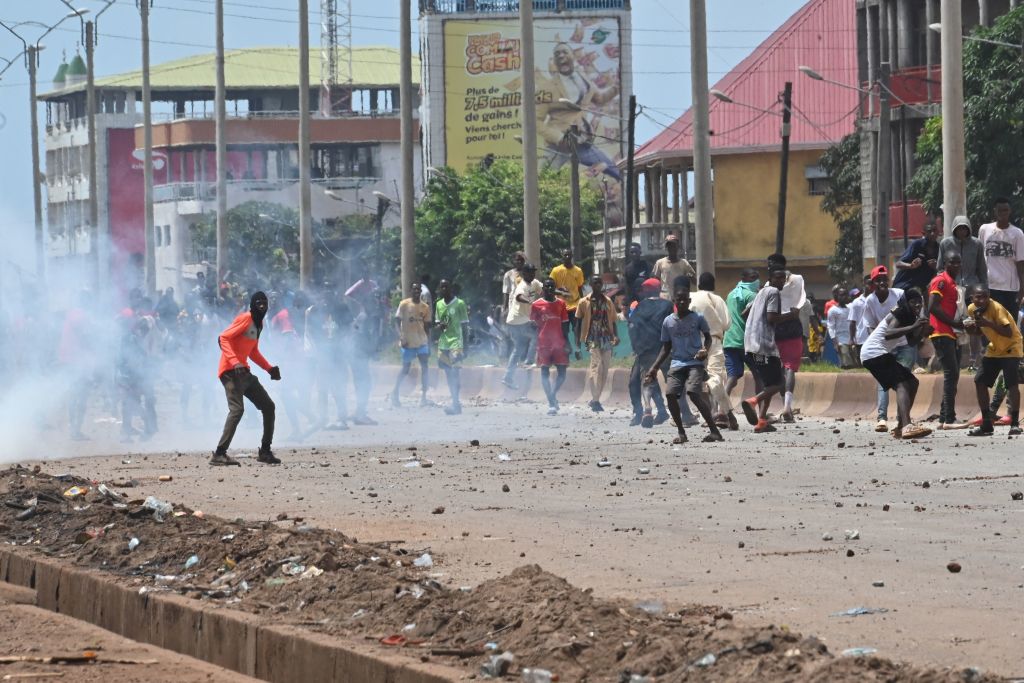ADF STAFF
Three members of Guinea’s National Front for the Defense of the Constitution (FNDC) were planning a demonstration against the country’s military junta when soldiers dressed as civilians arrived in armored vehicles and arrested them on July 9.
The young men, Mamadou Billo Bah, Mohammed Cissé and Oumar Sylla, were taken to a jail on the island of Kissa.
“There was a gendarme who gave me a slap and another one gave me a violent blow with his foot,” Cissé told Guinea’s FNDC TV.
Cissé said the soldiers hit them in the face with metal bars and asked who finances their operations. One of the soldiers told Cissé he would regret inciting people against the junta led by Gen. Mamady Doumbouya and threatened to pull out all of his teeth.
Cissé was released a day after his arrest, but Bah and Sylla, also known as Foniké Menguè, have not been seen since. Such arbitrary arrests — or “forced abductions,” as the FNDC claims — of political activists and the absence of a clear electoral timeline are fueling tensions in Guinea. Shortly after the arrests of Bah, Cissé and Sylla, Guinean lawyers began a two-week strike on Tuesday to protest arbitrary arrests.
After seizing power in 2021, Doumbouya announced that a civilian government would be elected by the end of this year.
“Considering what was presented to us on September 5, 2021, and what we are experiencing today, it is clear that the promises have not been fulfilled, particularly regarding the respect for human rights and the commitment to restore constitutional order,” Fodé Baldé, an opposition leader with the Union of Republican Forces said in a report on africanews.com. “We can conclude that the promises have not been kept.”
In an agreement with the Economic Community of West African States, the Doumbouya junta promised to abide by a 10-point roadmap but has failed to take steps toward a transition. The junta insists that the transition plan start with a population census. According to the Africa Center for Strategic Studies, that is not likely to happen until August 2025.
“Moving at the junta’s pace, the rest of the transition could be put off for years,” Alix Boucher wrote for the center.
Baldé said there is now “a tangible sense of fear in Conakry,” the national capital, and in Kaloum, an urban sub-prefecture in Conakry, amid heightened security measures and the military’s acquisition of new tanks.
“It is hoped that these actions are aimed at countering potential terrorist threats,” Baldé said in the africanews.com report. “Nevertheless, there are clear indicators of unrest. During Guinea’s independence parade on October 2, the only armed unit present was the special forces.”
Doumbouya’s government has banned public protests and those who do protest are violently suppressed. According to Amnesty International, at least 47 people were killed during protests between June 2022 and March 2024. More than 75% of the victims were under 25 and 40% under 18. A large number of those injured in protests were children.
Elhadj Bailo Diallo, 16, lost sight in his right eye after being hit by a tear gas canister fired by defense and security forces. Thierno Madiou Diallo, also 16, was shot and had to have a leg amputated. The youngest of the injured was a 9-year-old girl who was struck by a stray bullet in her home. Mamadou Sadjo Balde, a young protester, said security forces briefly forced him into a vehicle and beat him. “After hitting me, they got out of the vehicle, kicked me twice, then got back in the vehicle and drove off,” Balde told Amnesty International.
Guinean forces are also accused of leaving seriously injured victims behind instead of providing them with assistance. Some victims were arrested and detained without medical care, sometimes for several days. Guinean military and security forces are rarely convicted for unlawful use of force.
“The Guinean authorities must guarantee the rights to freedom of expression and peaceful assembly, strictly respect the principles of international law on the use of force and firearms by law enforcement, and ensure that anyone injured during protests is treated promptly by medical services, without the condition of paying medical costs in advance,” Samira Daoud, Amnesty International’s regional director for West and Central Africa, said on the organization’s website.
Guinea’s media space is also shrinking amid the turmoil with little information coming into or out of the country. The junta has restricted internet access, stopped radio and television broadcasts and cracked down on independent media outlets.
In December 2021, the junta established the Court to Stop Economic Crimes. According to Boucher, however, the court has only investigated, tried and convicted former members of government and members of the opposition.
“By seizing power, the Doumbouya … junta is seemingly aiming to assert the Guinean military’s perceived entitlement to rule,” Boucher wrote.

